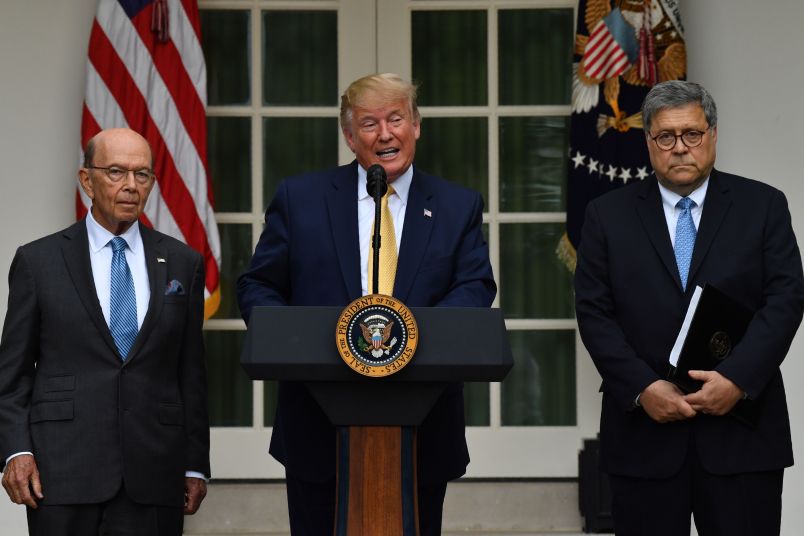The federal judge in the census citizenship case imposed limited sanctions on the Trump administration Thursday for the Justice Department’s failure to produce hundreds of documents it was obligated to turn over before the trial.
The order by U.S. District Judge Jesse Furman of New York on Thursday was a partial victory for the challengers. They has also sought sanctions and additional discovery related to allegations that administration-linked witnesses lied in the litigation, but Furman denied that request.
In his order, Furman said he was not granting that aspect of their request because, even if the witnesses’ testimony was false, it would not have changed the outcome of the trial and the final decision of the Supreme Court.
“To be clear, that conclusion is not based on a finding that Plaintiffs’ troubling allegations are wrong; the Court intimates no view on that question,” Furman said.
Furman called the challengers’ reasons for making the allegations “compelling” and said that those reasons became “only more compelling when Defendants confirmed that there were still more documents that should have been, but were not, produced in the course of discovery.”
The defendants in the case were the Commerce Department, Commerce Secretary Wilbur Ross, the Census Bureau and its director, whom at the time of the lawsuit was Ron Jarmin. Furman scolded the Justice Department, who represented the government, for its discovery flub, while casting shade on its aggressive attempts at getting the Supreme Court to intervene in his handling of the case.
The Justice Department belatedly produced 900 documents, amounting to about 10 percent of the total discovery in the case. Furman said the “technical error” that the Justice Department cited as its explanation for why the documents weren’t produced was the kind of “lapse that would make a first-year litigation associate wince.”
Furman is ordering that the administration pay for the challengers’ attorneys fees and costs associated with their efforts to pursue the sanctions.
Furman’s order was the denouement to a several-year saga over the Trump administration’s effort to add a citizenship question to the 2020 census. Furman blocked the move in January 2019 because he concluded that the way the administration went about adding the question violated the Administrative Procedure Act. The Supreme Court upheld Furman’s decision last summer, on the basis that the administration’s stated reason for adding the question — supposedly for Voting Rights Act enforcement — was bogus.
But even after the Supreme Court ruled against the administration, and President Trump backed down from his threats to try to circumvent the ruling to get the question back on the census, the legal wrangling continued.
Just before the Supreme Court decision came down, the challengers got their hands on evidence pointing to the question’s alternate purpose: to facilitate a scheme that would skew the redistricting process in favor of white, Republican voters, to the detriment of Latino communities.
Furman’s order Thursday recounted the revelation of the new evidence, which was a memo written by the now deceased GOP gerrymandering expert Thomas Hofeller and additional documents that linked him to the administration’s efforts to add the question.
The challengers had alleged that two witnesses had made false statements related to Hofeller’s involvement, which in turned hampered discovery that could have shed light on the administration’s true motives.
Furman concluded that the testimony of one of the witnesses was “troubling,” but the record stopped short of showing that it part of a “broader scheme orchestrated by Defendants or their attorneys to intentionally mislead the Court.”
Allegations about the other witness’ testimony were more a question of semantics, Furman said, and the record did not show that the witness “intentionally” misled the court. Nor was there “clear and convincing evidence of bad faith,” Furman said.
“At the end of the day, the NGO Plaintiffs allegations of misconduct merely reinforce their overall theory of this case: that Secretary Ross’s decision to add a citizenship question to the 2020 decennial census questionnaire was not made for the reasons he gave,” Furman said, in explaining why he wasn’t imposing sanctions beyond the attorneys fees and costs he rewarded for the discovery screw up.
“In the final analysis, although the NGO Plaintiffs allegations are troubling, so too were the facts that won them a victory at trial and in the Supreme Court. Plaintiffs’ theory of the case could hardly need more judicial vindication than that,” Furman said.
He acknowledged that, despite “truth-seeking function” of litigation, “sometimes produces an incomplete or unsatisfying version of the facts.”
“If there is more to the story, principles of judicial restraint counsel in favor of letting it be uncovered and told somewhere else,” he said.
Read his order below:



